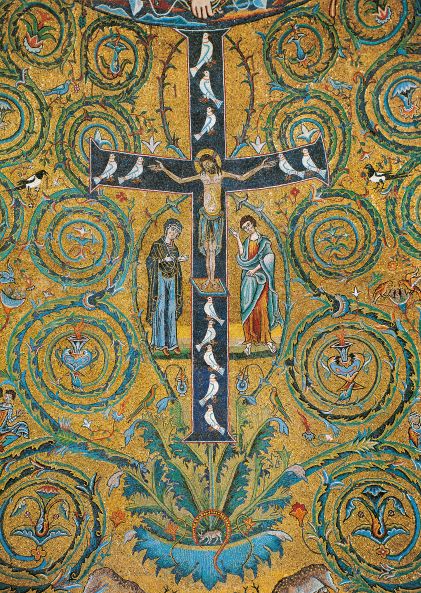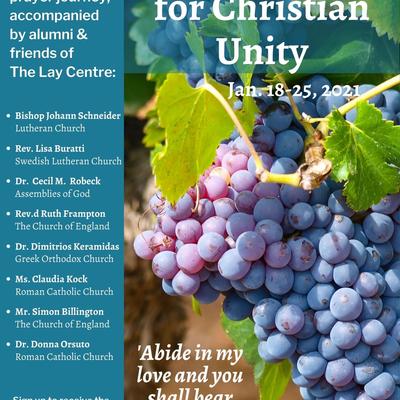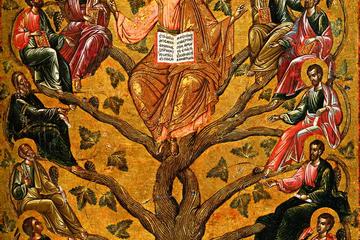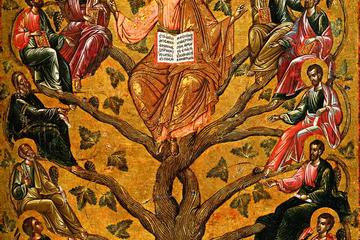
Detail of the apse mosaic in the Basilica of San Clemente, ©Basilica San Clemente (Rome). Used with permission of the Irish Dominican Fathers.
This year’s theme for the Week of Prayer for Christian Unity is “Abide in my love and you shall bear much fruit” (Jn 15:5-9). Each contributor to our series has reflected on a daily verse from this Scripture passage, as indicated by the Pontifical Council for Promoting Christian Unity, for each day of the octave.
Today, Day Eight, Dr. Donna Orsuto reflects on the verse “So that my joy may be in you, and that your joy may be complete” (Jn 15:11) along with Colossians 1:15-20.
Reconciling with all of creation
By Donna Orsuto
The Week of Prayer for Christian Unity culminates with the call to be reconciled with all of creation and the Johannine words, “So that my joy may be in you, and that your joy may be complete” (Jn 15:11). The sheer gift of joy given by Jesus Christ is ours to experience and to share as we abide in his love.
It is also the joy that comes from knowing that Jesus Christ is the source of our reconciliation with all of creation and the foundation of our unity in the Church. As St. Paul reminds us in the “Christ hymn” (Col 1:15-20), found at the beginning of the Letter to the Colossians, Jesus Christ “is before all things and in him all things hold together” (Col 1:17).
In his encyclical “Laudato si’,” Pope Francis refers to the “Christ hymn.” He writes:
“In the Christian understanding of the world, the destiny of all creation is bound up with the mystery of Christ, present from the beginning: “All things have been created though him and for him” (Col 1:16)…. The New Testament does not only tell us of the earthly Jesus and his tangible and loving relationship with the world. It also shows him risen and glorious, present throughout creation by his universal Lordship: “For in him all the fullness of God was pleased to dwell, and through him to reconcile to himself all things, whether on earth or in heaven, making peace by the blood of his cross” (Col 1:19-20) (99-100).
Jesus is Lord of all creation and also of us all as we gather together to pray for Christian unity. He has brought peace and reconciliation to us by “the blood of his cross.” By clinging to him, we are bound more closely with one another and with all of creation.
Most Scripture scholars recognize that Colossians 1:15-20, an ancient hymn, either adopted by St. Paul or composed by him, was used in the context of worship, perhaps even for baptisms. Whatever the context, when sung, it drew those early Christians together to worship and praise the One who holds all things together.
St. Paul was a troubleshooter, and all of his letters are a response to problems in the local church, in this case, the Church in Colossae, a community in need of conversion and reconciliation. We, too, are in need of conversion and reconciliation, and this is why it is good to take time to meditate on this “Christ hymn”:
He is the image of the invisible God, the firstborn of all creation. For in him were created all things in heaven and on earth, the visible and the invisible, whether thrones or dominions or principalities or powers; all things were created through him and for him. He is before all things, and in him all things hold together. He is the head of the body, the church. He is the beginning, the firstborn from the dead, that in all things he himself might be preeminent. For in him all the fullness was pleased to dwell, and through him to reconcile all things for him, making peace by the blood of his cross (through him), whether those on earth or those in heaven.
I now invite you to take some time to gaze at the detail of the apse mosaic of the Basilica of San Clemente in Rome, which in visible form shows us both the source of our joy and of our reconciliation with one another and with all of creation.
As a musical suggestion, I would recommend listening to, and paying attention to, the words of the “Ode to Joy: Joyful, Joyful, We Adore Thee.”
May we spread this joy to all whom we meet during this Week of Prayer for Christian Unity and throughout the year.
Suggested listening: “Ode to Joy: Joyful,Joyful,We Adore Thee”
Image: Apse mosaic in the Basilica of San Clemente - used with permission of the Irish Dominican Fathers ©Basilica San Clemente (Rome)
Donna Orsuto is the co-founder and director of The Lay Centre and a professor of spirituality at the Pontifical Gregorian University.




